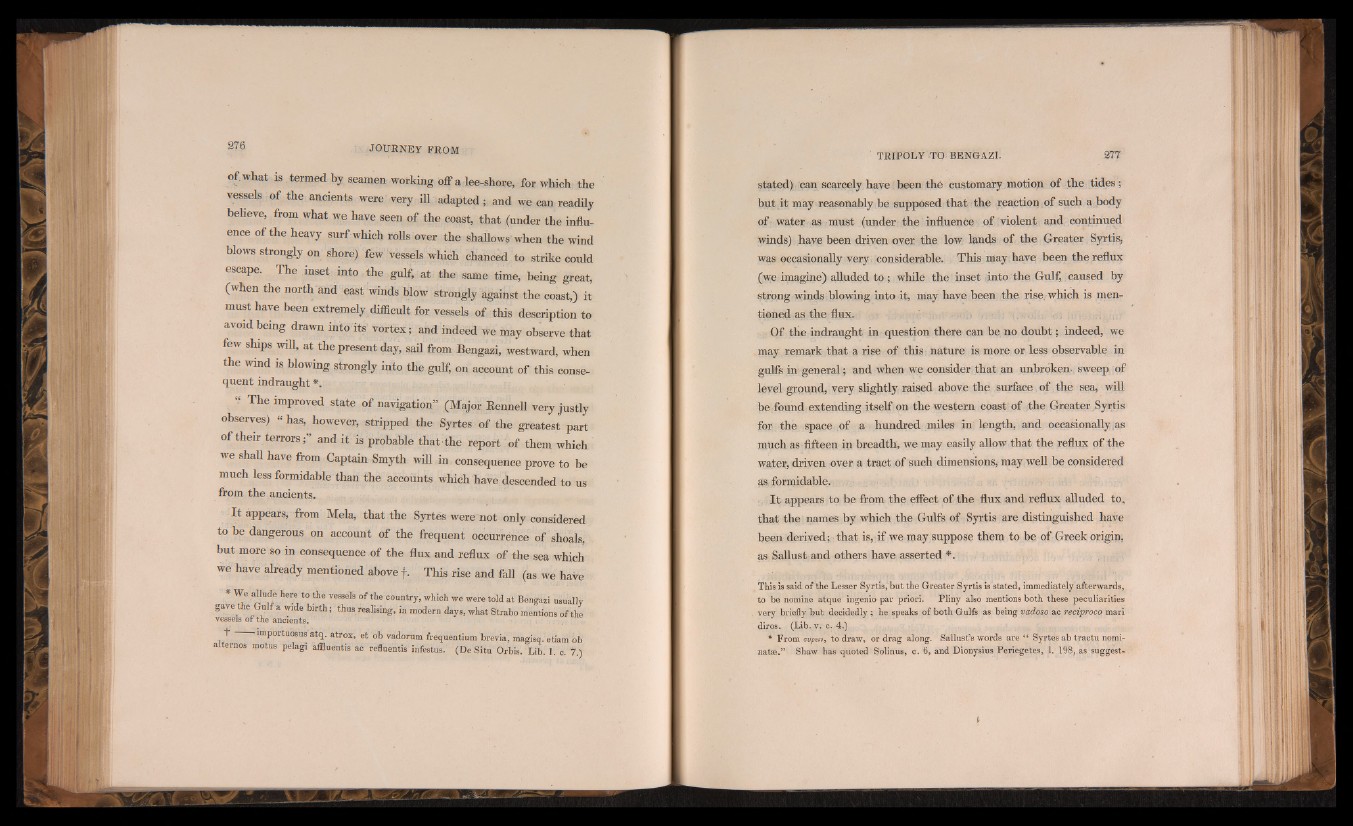
of. what is. termed by seamen working off a lee-shore, for which the
vessels of the ancients were very ill adapted; and we can readily
believe, from what we have seen of the coast, that (under the influence
of the heavy surf which rolls over the shallows when the wind
blows strongly on shore) few vessels which chanced to strike could
escape. The inset into the gulf, at the same time, being great,
(when the north and east winds blow strongly against the coast,) it
must have been extremely difficult for vessels of this description to
avoid being drawn into its vortex; and indeed we may observe that
few ships will, at the present day, sail from Bengazi, westward, when
the wmd is blowing strongly into the gulf, on account of this conse-
quent indraught
“ The improved state of navigation” (Major Eennell very justly
observes) “ has, however, stripped the Syrtes of the greatest part
of their terrors;” and it is probable that the report of them which
we shall have from Captain Smyth will in consequence prove to be
much less formidable than the accounts which have descended to us
from the ancients.
I t appears, from Mela, that the Syrtes were not only considered
to be dangerous on account of the frequent occurrence of shoals,
but more so in consequence of the flux and reflux of the sea which
we have already mentioned above f. This rise and fall (as we have
* We allude here to the vessels of the country, which we were told at Bengazi usually
gave the Gulf a wide birth; thus realising, in modern days, what Strabo mentions of the
vessels of the ancients.
^ importuosus atq. atror, et ob vadorum frequentium brevia, magisq. etiam ob
al tern os motus pelagi affluentis ac reflnentis infestus. (De Situ Orbis. Lib. 1. c. '7.)
stated) can scarcely have been the customary motion of the tides ;
bqt it may reasonably be supposed that the reaction of such a body
of water as must (under the influence of violent and continued
winds) have been driven over, the low lands of the Greater Syrtis,
was occasionally very. considerable. This may have been the reflux
(we imagine) alluded to ; while the inset into the, Gulf, caused by
strong winds blowing into it, may have been the rise-which is mentioned
as the flux.
Of the indraught in question there can be no doubt ; indeed, we
may remark that a rise of this nature is more or less observable in
gulfs in- general ; and when we consider that an unbroken- sweep of
level ground, very slightly raised above the surface of the sea, will
be found extending itself on the western coast of the Greater .Syrtis
for the space of a hundred miles in length, and occasionally,as
much as fifteen in breadth, we may easily allow that the reflux of the
water, driven over a tract of such dimensions, may, well be considered
as formidable.
. I t appears to be from the effect of the flux and reflux alluded to,
that the names by which the Gulfs of Syrtis are distinguished have
been derived ; that is, if we may suppose them to be of Greek origin,
as Sallust and others have asserted *.
This is said of the Lesser Syrtis, but the Greater Syrtis is stated, immediately afterwards,
to be nomine atque ingenio par priori. Pliny also mentions both these peculiarities
very briefly but decidedly ; he speaks of both Gulfs as being vadoso ac reciproco mari
diros. (Lib. v. c. 4.)
* From ffvpeiv, to draw, or drag along. Sallust’s words are “ Syrtes ab tractu nomi-
natæ.” Shaw has quoted Solinus, c. 6, and Dionysius Periegetes, 1. 198, as suggest